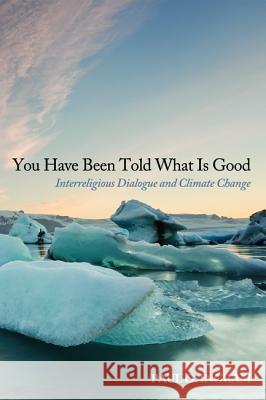You Have Been Told What Is Good » książka
You Have Been Told What Is Good
ISBN-13: 9781498293488 / Angielski / Miękka / 2016 / 146 str.
You Have Been Told What Is Good
ISBN-13: 9781498293488 / Angielski / Miękka / 2016 / 146 str.
(netto: 79,42 VAT: 5%)
Najniższa cena z 30 dni: 82,47
ok. 16-18 dni roboczych.
Darmowa dostawa!
The radical interdependency of justice, compassion, and solidarity of community working for the common good are ideals celebrated in the religious Ways of humanity. Human beings at all times and in all places have known what is good, but for reasons too numerous to count have failed to act justly and compassionately in communal harmony with one other and with the sentient beings with whom we share life on planet Earth. Today the major justice issue confronting us is human-caused environmental destruction running amok on this planet, the only place in the universe where our species is alive. Accordingly, this book offers socially engaged dialogue between persons representing the world's religious Ways. (The natural sciences are included as a third partner.) The dialogue presented in this book is a powerful resource for confronting and stopping the causes of climate change. But we must do so before it's too late. ""The dialogue among religious communities has advanced a great deal during the last few decades.The 2015 meeting of the Parliament of the World's Religions moved on from the conversation to the question of how all can contribute to slowing global warming.In this book, Paul Ingram is providing the shared grounding through which, working together, these traditions can contribute to realizing the authentic community they all seek."" --John B. Cobb, Jr., Professor Emeritus, Claremont School of Theology ""In this new gem of a book, Paul Ingram carries on his long-term project of bringing the history of religions into dialogue with science and theology.This time, however, he brings his three-fold focus to bear on how the resources of the many religious 'Ways' can be brought to bear on the challenge of our time--climate change caused by the idolatry of market-based consumerism.The result may turn out to be just what we need--an emphasis on justice and compassion, rooted in the religious traditions, that can orient humanity to reshape itself to live long and well on our terrestrial home."" --G. Michael Zbaraschuk, Assistant Professor of Religion, Pacific Lutheran University ""What if we were to place compassionate justice in community at the heart of our economic thinking? This, Ingram argues, is the key to healing the planet. Drawing upon the shared values of the world's religions, Ingram issues an inspiring call to action."" --Sallie B. King, Professor Emerita, James Madison University; author ofSocially Engaged Buddhism(University of Hawai'i Press) Paul O. Ingram is Professor Emeritus of Religion at Pacific Lutheran University, where he taught for thirty-five years. Among his many publications are Wrestling with the Ox (Wipf & Stock, 2006), Wrestling with God (Cascade Books, 2006) Buddhist-Christian Dialogue in an Age of Science (2008), Theological Reflections at the Boundaries (Cascade Books, 2011), The Process of Buddhist-Christian Dialogue (Cascade Books, 2009), Passing Over and Returning (Cascade Books, 2013), and Living without a Why (Cascade Books, 2014)."
The radical interdependency of justice, compassion, and solidarity of community working for the common good are ideals celebrated in the religious Ways of humanity. Human beings at all times and in all places have known what is good, but for reasons too numerous to count have failed to act justly and compassionately in communal harmony with one other and with the sentient beings with whom we share life on planet Earth. Today the major justice issue confronting us is human-caused environmental destruction running amok on this planet, the only place in the universe where our species is alive. Accordingly, this book offers socially engaged dialogue between persons representing the worlds religious Ways. (The natural sciences are included as a third partner.) The dialogue presented in this book is a powerful resource for confronting and stopping the causes of climate change. But we must do so before its too late.""The dialogue among religious communities has advanced a great deal during the last few decades. The 2015 meeting of the Parliament of the Worlds Religions moved on from the conversation to the question of how all can contribute to slowing global warming. In this book, Paul Ingram is providing the shared grounding through which, working together, these traditions can contribute to realizing the authentic community they all seek."" --John B. Cobb, Jr., Professor Emeritus, Claremont School of Theology""In this new gem of a book, Paul Ingram carries on his long-term project of bringing the history of religions into dialogue with science and theology. This time, however, he brings his three-fold focus to bear on how the resources of the many religious Ways can be brought to bear on the challenge of our time--climate change caused by the idolatry of market-based consumerism. The result may turn out to be just what we need--an emphasis on justice and compassion, rooted in the religious traditions, that can orient humanity to reshape itself to live long and well on our terrestrial home."" --G. Michael Zbaraschuk, Assistant Professor of Religion, Pacific Lutheran University""What if we were to place compassionate justice in community at the heart of our economic thinking? This, Ingram argues, is the key to healing the planet. Drawing upon the shared values of the worlds religions, Ingram issues an inspiring call to action.""--Sallie B. King, Professor Emerita, James Madison University; author of Socially Engaged Buddhism (University of Hawaii Press)Paul O. Ingram is Professor Emeritus of Religion at Pacific Lutheran University, where he taught for thirty-five years. Among his many publications are Wrestling with the Ox (Wipf & Stock, 2006), Wrestling with God (Cascade Books, 2006) Buddhist-Christian Dialogue in an Age of Science (2008), Theological Reflections at the Boundaries (Cascade Books, 2011), The Process of Buddhist-Christian Dialogue (Cascade Books, 2009), Passing Over and Returning (Cascade Books, 2013), and Living without a Why (Cascade Books, 2014).











